
Publications
-
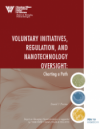 November 4, 2010
PEN 19 - Voluntary Initiatives, Regulation, and Nanotechnology Oversight
Charting a Path
Enough voluntary initiatives for nanotechnology have been implemented so they can be looked at together, in a comparative sense, and historically, in terms of their relationship to programs that have preceded them. This report provides that analysis for the first time.
Dr. Daniel J. Fiorino
November 4, 2010
PEN 19 - Voluntary Initiatives, Regulation, and Nanotechnology Oversight
Charting a Path
Enough voluntary initiatives for nanotechnology have been implemented so they can be looked at together, in a comparative sense, and historically, in terms of their relationship to programs that have preceded them. This report provides that analysis for the first time.
Dr. Daniel J. Fiorino
-
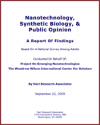 September 29, 2009
Nanotechnology, Synthetic Biology, & Public Opinion
A Report Of Findings Based On A National Survey Among Adults
A groundbreaking poll of 1,001 U.S. adults conducted by Peter D. Hart Research Associates and the Project on Emerging Nanotechnologies (PEN) found 90 percent of Americans think that the public should be better informed about the development of cutting-edge technologies.
Peter D. Hart Research Associates, Inc.
September 29, 2009
Nanotechnology, Synthetic Biology, & Public Opinion
A Report Of Findings Based On A National Survey Among Adults
A groundbreaking poll of 1,001 U.S. adults conducted by Peter D. Hart Research Associates and the Project on Emerging Nanotechnologies (PEN) found 90 percent of Americans think that the public should be better informed about the development of cutting-edge technologies.
Peter D. Hart Research Associates, Inc.
-
 August 25, 2009
Nanotechnology and Consumer Products
CPSC Hearing
Project Director David Rejeski’s Comments at the CPSC hearings
David Rejeski
August 25, 2009
Nanotechnology and Consumer Products
CPSC Hearing
Project Director David Rejeski’s Comments at the CPSC hearings
David Rejeski
-
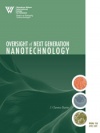 April 28, 2009
PEN 18 - Oversight of Next Generation Nanotechnology
Existing health and safety agencies are unable to cope with the risk assessment, standard setting and oversight challenges of advancing nanotechnology.
J. Clarence Davies
April 28, 2009
PEN 18 - Oversight of Next Generation Nanotechnology
Existing health and safety agencies are unable to cope with the risk assessment, standard setting and oversight challenges of advancing nanotechnology.
J. Clarence Davies
-
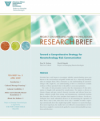 April 6, 2009
Toward a Comprehensive Strategy for Nanotechnology Risk Communication
Cultural Cognition and Nanotechnology Risk Perceptions
The last in a trio of studies: Cultural Cognition and Nanotechnology Risk Perceptions: An Experimental Investigation of Message Framing, asks what science will reveal about the risks and benefits of nanotechnology and what conclusions members of the public will form? It takes an in depth look at the power of information framing to accentuate or mitigate cultural polarization.
Dan M. Kahan, David Rejeski
April 6, 2009
Toward a Comprehensive Strategy for Nanotechnology Risk Communication
Cultural Cognition and Nanotechnology Risk Perceptions
The last in a trio of studies: Cultural Cognition and Nanotechnology Risk Perceptions: An Experimental Investigation of Message Framing, asks what science will reveal about the risks and benefits of nanotechnology and what conclusions members of the public will form? It takes an in depth look at the power of information framing to accentuate or mitigate cultural polarization.
Dan M. Kahan, David Rejeski
-
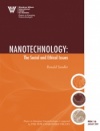 January 27, 2009
PEN 16 - Nanotechnology: The Social and Ethical Issues
“It is crucial to address social and ethical issues now as we consider both the substantial potential risks of nanotechnology and its possible significant contributions to our well-being and environmental sustainability,” says report author Ronald Sandler. PEN 16 emphasizes ways in which these issues intersect with governmental functions and responsibilities, including science and technology policy, as well as research funding, regulation and work on public engagement.
Ronald Sandler
January 27, 2009
PEN 16 - Nanotechnology: The Social and Ethical Issues
“It is crucial to address social and ethical issues now as we consider both the substantial potential risks of nanotechnology and its possible significant contributions to our well-being and environmental sustainability,” says report author Ronald Sandler. PEN 16 emphasizes ways in which these issues intersect with governmental functions and responsibilities, including science and technology policy, as well as research funding, regulation and work on public engagement.
Ronald Sandler
-
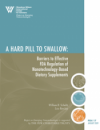 January 14, 2009
PEN 17 - A Hard Pill to Swallow
Barriers to Effective FDA Regulation of Nanotechnology-Based Dietary Supplements
Historically, the regulation of dietary supplements has been a significant challenge for the U.S. Food and Drug Administration (FDA), and the fact that some of these products are now being manufactured using nanotechnology creates an additional layer of complexity. Is FDA equipped to meet the emerging regulatory challenge of dietary supplements that use engineered nanomaterials?
William B. Schultz and Lisa Barclay
January 14, 2009
PEN 17 - A Hard Pill to Swallow
Barriers to Effective FDA Regulation of Nanotechnology-Based Dietary Supplements
Historically, the regulation of dietary supplements has been a significant challenge for the U.S. Food and Drug Administration (FDA), and the fact that some of these products are now being manufactured using nanotechnology creates an additional layer of complexity. Is FDA equipped to meet the emerging regulatory challenge of dietary supplements that use engineered nanomaterials?
William B. Schultz and Lisa Barclay
-
 December 9, 2008
Federal Government Nanotechnology Environment, Health and Safety Research
Near-term Annual Funding Options
Federal risk-research funding options for moving forward under the next administration
December 9, 2008
Federal Government Nanotechnology Environment, Health and Safety Research
Near-term Annual Funding Options
Federal risk-research funding options for moving forward under the next administration
-
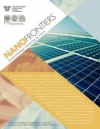 October 3, 2008
Nanotechnology: Energizing the Future
Nanofrontiers Newsletter Fall 2008
Industry and government are searching for new technologies that will foster more efficient and less-polluting energy sources. From nano-enabled solar panels to long-lasting automobile batteries, nanotechnology will be a cornerstone of 21st Century energy sources.
Jason Ortego
October 3, 2008
Nanotechnology: Energizing the Future
Nanofrontiers Newsletter Fall 2008
Industry and government are searching for new technologies that will foster more efficient and less-polluting energy sources. From nano-enabled solar panels to long-lasting automobile batteries, nanotechnology will be a cornerstone of 21st Century energy sources.
Jason Ortego
-
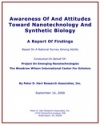 September 18, 2008
Poll: Risks and Benefits of Nanotechnology & Synthetic Biology
A Report of Findings, Based On A National Survey Among Adults
A groundbreaking poll finds that almost half of U.S. adults have heard nothing about nanotechnology, and nearly nine in 10 Americans say they have heard just a little or nothing at all about the emerging field of synthetic biology, according to a new report released by the Project and Peter D. Hart Research. Both technologies involve manipulating matter at an incredibly small scale to achieve something new.
Peter D. Hart Research Associates, Inc.
September 18, 2008
Poll: Risks and Benefits of Nanotechnology & Synthetic Biology
A Report of Findings, Based On A National Survey Among Adults
A groundbreaking poll finds that almost half of U.S. adults have heard nothing about nanotechnology, and nearly nine in 10 Americans say they have heard just a little or nothing at all about the emerging field of synthetic biology, according to a new report released by the Project and Peter D. Hart Research. Both technologies involve manipulating matter at an incredibly small scale to achieve something new.
Peter D. Hart Research Associates, Inc.
 November 4, 2010
PEN 19 - Voluntary Initiatives, Regulation, and Nanotechnology Oversight
Charting a Path
Enough voluntary initiatives for nanotechnology have been implemented so they can be looked at together, in a comparative sense, and historically, in terms of their relationship to programs that have preceded them. This report provides that analysis for the first time.
November 4, 2010
PEN 19 - Voluntary Initiatives, Regulation, and Nanotechnology Oversight
Charting a Path
Enough voluntary initiatives for nanotechnology have been implemented so they can be looked at together, in a comparative sense, and historically, in terms of their relationship to programs that have preceded them. This report provides that analysis for the first time.
 September 29, 2009
Nanotechnology, Synthetic Biology, & Public Opinion
A Report Of Findings Based On A National Survey Among Adults
A groundbreaking poll of 1,001 U.S. adults conducted by Peter D. Hart Research Associates and the Project on Emerging Nanotechnologies (PEN) found 90 percent of Americans think that the public should be better informed about the development of cutting-edge technologies.
September 29, 2009
Nanotechnology, Synthetic Biology, & Public Opinion
A Report Of Findings Based On A National Survey Among Adults
A groundbreaking poll of 1,001 U.S. adults conducted by Peter D. Hart Research Associates and the Project on Emerging Nanotechnologies (PEN) found 90 percent of Americans think that the public should be better informed about the development of cutting-edge technologies.
 August 25, 2009
Nanotechnology and Consumer Products
CPSC Hearing
Project Director David Rejeski’s Comments at the CPSC hearings
August 25, 2009
Nanotechnology and Consumer Products
CPSC Hearing
Project Director David Rejeski’s Comments at the CPSC hearings
 April 28, 2009
PEN 18 - Oversight of Next Generation Nanotechnology
Existing health and safety agencies are unable to cope with the risk assessment, standard setting and oversight challenges of advancing nanotechnology.
April 28, 2009
PEN 18 - Oversight of Next Generation Nanotechnology
Existing health and safety agencies are unable to cope with the risk assessment, standard setting and oversight challenges of advancing nanotechnology.
 April 6, 2009
Toward a Comprehensive Strategy for Nanotechnology Risk Communication
Cultural Cognition and Nanotechnology Risk Perceptions
The last in a trio of studies: Cultural Cognition and Nanotechnology Risk Perceptions: An Experimental Investigation of Message Framing, asks what science will reveal about the risks and benefits of nanotechnology and what conclusions members of the public will form? It takes an in depth look at the power of information framing to accentuate or mitigate cultural polarization.
April 6, 2009
Toward a Comprehensive Strategy for Nanotechnology Risk Communication
Cultural Cognition and Nanotechnology Risk Perceptions
The last in a trio of studies: Cultural Cognition and Nanotechnology Risk Perceptions: An Experimental Investigation of Message Framing, asks what science will reveal about the risks and benefits of nanotechnology and what conclusions members of the public will form? It takes an in depth look at the power of information framing to accentuate or mitigate cultural polarization.
 January 27, 2009
PEN 16 - Nanotechnology: The Social and Ethical Issues
“It is crucial to address social and ethical issues now as we consider both the substantial potential risks of nanotechnology and its possible significant contributions to our well-being and environmental sustainability,” says report author Ronald Sandler. PEN 16 emphasizes ways in which these issues intersect with governmental functions and responsibilities, including science and technology policy, as well as research funding, regulation and work on public engagement.
January 27, 2009
PEN 16 - Nanotechnology: The Social and Ethical Issues
“It is crucial to address social and ethical issues now as we consider both the substantial potential risks of nanotechnology and its possible significant contributions to our well-being and environmental sustainability,” says report author Ronald Sandler. PEN 16 emphasizes ways in which these issues intersect with governmental functions and responsibilities, including science and technology policy, as well as research funding, regulation and work on public engagement.
 January 14, 2009
PEN 17 - A Hard Pill to Swallow
Barriers to Effective FDA Regulation of Nanotechnology-Based Dietary Supplements
Historically, the regulation of dietary supplements has been a significant challenge for the U.S. Food and Drug Administration (FDA), and the fact that some of these products are now being manufactured using nanotechnology creates an additional layer of complexity. Is FDA equipped to meet the emerging regulatory challenge of dietary supplements that use engineered nanomaterials?
January 14, 2009
PEN 17 - A Hard Pill to Swallow
Barriers to Effective FDA Regulation of Nanotechnology-Based Dietary Supplements
Historically, the regulation of dietary supplements has been a significant challenge for the U.S. Food and Drug Administration (FDA), and the fact that some of these products are now being manufactured using nanotechnology creates an additional layer of complexity. Is FDA equipped to meet the emerging regulatory challenge of dietary supplements that use engineered nanomaterials?
 December 9, 2008
Federal Government Nanotechnology Environment, Health and Safety Research
Near-term Annual Funding Options
Federal risk-research funding options for moving forward under the next administration
December 9, 2008
Federal Government Nanotechnology Environment, Health and Safety Research
Near-term Annual Funding Options
Federal risk-research funding options for moving forward under the next administration
 October 3, 2008
Nanotechnology: Energizing the Future
Nanofrontiers Newsletter Fall 2008
Industry and government are searching for new technologies that will foster more efficient and less-polluting energy sources. From nano-enabled solar panels to long-lasting automobile batteries, nanotechnology will be a cornerstone of 21st Century energy sources.
October 3, 2008
Nanotechnology: Energizing the Future
Nanofrontiers Newsletter Fall 2008
Industry and government are searching for new technologies that will foster more efficient and less-polluting energy sources. From nano-enabled solar panels to long-lasting automobile batteries, nanotechnology will be a cornerstone of 21st Century energy sources.
 September 18, 2008
Poll: Risks and Benefits of Nanotechnology & Synthetic Biology
A Report of Findings, Based On A National Survey Among Adults
A groundbreaking poll finds that almost half of U.S. adults have heard nothing about nanotechnology, and nearly nine in 10 Americans say they have heard just a little or nothing at all about the emerging field of synthetic biology, according to a new report released by the Project and Peter D. Hart Research. Both technologies involve manipulating matter at an incredibly small scale to achieve something new.
September 18, 2008
Poll: Risks and Benefits of Nanotechnology & Synthetic Biology
A Report of Findings, Based On A National Survey Among Adults
A groundbreaking poll finds that almost half of U.S. adults have heard nothing about nanotechnology, and nearly nine in 10 Americans say they have heard just a little or nothing at all about the emerging field of synthetic biology, according to a new report released by the Project and Peter D. Hart Research. Both technologies involve manipulating matter at an incredibly small scale to achieve something new.

